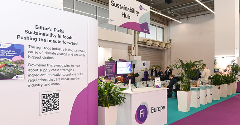News
Scientists discover how to unboil an egg
28 Jan 2015UC Irvine and Australian chemists say they have figured out how to unboil egg whites – an innovation that they claim could dramatically reduce costs for cancer treatments, food production and other segments of the $160 billion global biotechnology industry, according to findings published in the journal ChemBioChem. “Yes, we have invented a way to unboil […]

 UC Irvine and Australian chemists say they have figured out how to unboil egg whites – an innovation that they claim could dramatically reduce costs for cancer treatments, food production and other segments of the $160 billion global biotechnology industry, according to findings published in the journal ChemBioChem.
UC Irvine and Australian chemists say they have figured out how to unboil egg whites – an innovation that they claim could dramatically reduce costs for cancer treatments, food production and other segments of the $160 billion global biotechnology industry, according to findings published in the journal ChemBioChem.
“Yes, we have invented a way to unboil a hen egg,” said Gregory Weiss, UCI professor of chemistry and molecular biology & biochemistry. “In our paper, we describe a device for pulling apart tangled proteins and allowing them to refold. We start with egg whites boiled for 20 minutes at 90 degrees Celsius and return a key protein in the egg to working order.”
Like many researchers, he has struggled to efficiently produce or recycle valuable molecular proteins that have a wide range of applications but which frequently “misfold” into structurally incorrect shapes when they are formed, rendering them useless.
“It’s not so much that we’re interested in processing the eggs; that’s just demonstrating how powerful this process is,” Weiss said. “The real problem is there are lots of cases of gummy proteins that you spend way too much time scraping off your test tubes, and you want some means of recovering that material.”
But older methods are expensive and time-consuming: the equivalent of dialysis at the molecular level must be done for about four days, the scientists said.
“The new process takes minutes,” Weiss noted. “It speeds things up by a factor of thousands.”
To re-create a clear protein known as lysozyme once an egg has been boiled, he and his colleagues add a urea substance that chews away at the whites, liquefying the solid material. That’s half the process; at the molecular level, protein bits are still balled up into unusable masses. The scientists then employ a vortex fluid device, a high-powered machine designed by Professor Colin Raston’s laboratory at South Australia’s Flinders University. Shear stress within thin, microfluidic films is applied to those tiny pieces, forcing them back into untangled, proper form.
“This method … could transform industrial and research production of proteins,” the researchers write in ChemBioChem.
For example, pharmaceutical companies currently create cancer antibodies in expensive hamster ovary cells that do not often misfold proteins. The ability to quickly and cheaply re-form common proteins from yeast or E. coli bacteria could potentially streamline protein manufacturing and make cancer treatments more affordable. Industrial cheese makers, farmers and others who use recombinant proteins could also achieve more bang for their buck.
UCI has filed for a patent on the work, and its Office of Technology Alliances is working with interested commercial partners.
Related news

The winners of Vitafoods Europe Startup Challenge 2025 revealed
29 May 2025
Four startups – Yomio Drops, PFx Biotech, Revobiom, and Favamole – took top prizes at this year’s Vitafoods Europe Startup Challenge awards.
Read more
East takes on West in the fight for future food flavours
30 Apr 2025
Asian and South American flavours are now key components on global menus, driven by a growing global appetite for culinary mashups.
Read more
Food companies urged to bring ‘joy’ and urgency to healthy food mission
14 Mar 2025
For too long, businesses have treated health and sustainability as separate agendas – but there is growing evidence to show diets that benefit human health can also enhance that of the planet, say experts.
Read more
Entries open for inaugural Vitafoods Europe Innovation Awards
29 Jan 2025
Entries are open for the inaugural Vitafoods Europe Innovation Awards, celebrating the ingredients, finished products, partnerships, and initiatives redefining the nutraceutical landscape.
Read more
Paris Olympics: Food and beverage brands champion health, fun, and sustainability
5 Aug 2024
Food and beverage brands are aligning with the Paris Olympics 2024 Food Vision, which emphasises sustainability, local sourcing, and plant-based diets.
Read more
Natural Remedies: Bringing health and happiness via validated branded ingredients
18 Apr 2024
Natural Remedies is an internationally renowned botanical healthcare company committed to advancing the field through rigorous research and the development of clinically validated Branded Ingredients. Guided by our foundational principle of ‘BEING USEF...
Read more
Exploring the future of health and wellness retail at Vitafoods Europe
14 Mar 2024
With retail-focussed content sessions, buyer networking, and finished product tasting sessions, this year’s Vitafoods Europe offers a not-to-be-missed opportunity for retailers to up their health and wellness game.
Read more
Sustainability meets innovation at Fi Europe 2023's Sustainability Ingredients Zone
9 Jan 2024
Fi Europe’s Sustainable Ingredients Zone showcases ingredients forging a path toward a greener future. Three innovators are redefining what sustainability within the food and beverage industry means, with upcycled products, regenerative agriculture, an...
Read more
Unleashing the power of plants at Fi Europe’s New Product Zone
5 Jan 2024
In the diverse landscape of plant-based innovation, Fi Europe 2023's New Product Zone spotlighted ten plant-based ingredients, tailored to meet the rising demand for sustainable and delicious options.
Read more
Meet the innovative ingredients showcased at Fi Europe’s New Product Zone
3 Jan 2024
The Food Ingredients category at Fi Europe’s New Product Zone featured 19 distinct and innovative products. From fermented delights to sustainable proteins, these ingredients are ready to make their mark in the market.
Read more